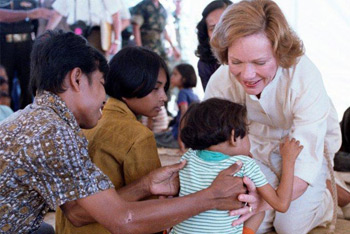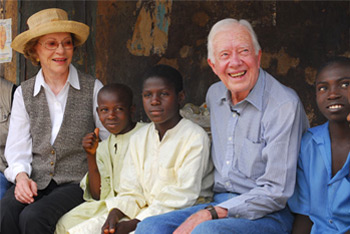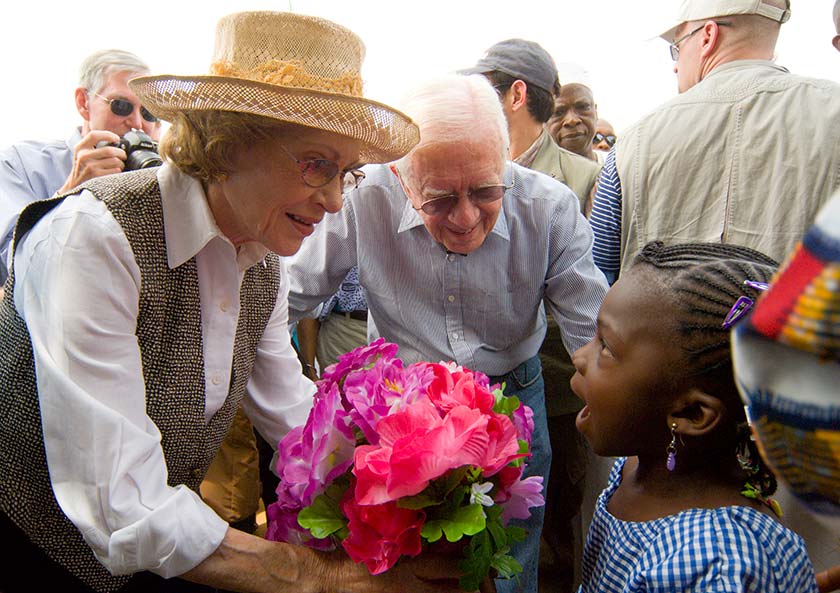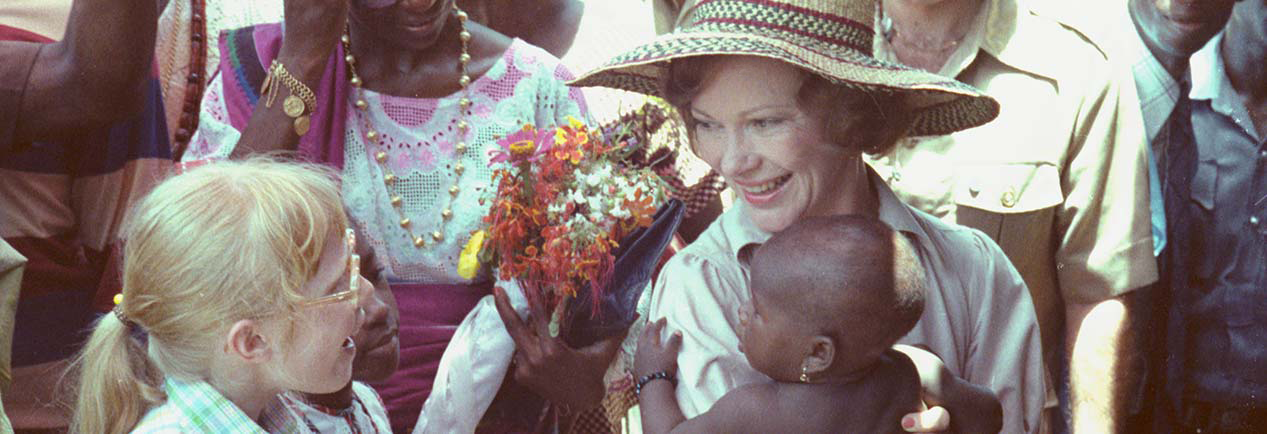Biography of Rosalynn Carter
Do what you can to show you care about others, and you will make our world a better place.
Former First Lady Rosalynn Carter’s marriage to Jimmy Carter took her from a rural farming community to the White House. Showing the world a new vision of the First Lady, Mrs. Carter was a working partner and trusted advisor to the president, a participant in foreign and domestic affairs, and an astute political strategist. Widely recognized as the nation’s foremost advocate for mental health, she was actively devoted to building a more caring society.
The White House Years
While assuming the traditional demands of presidential wife and official White House hostess, Mrs. Carter worked tirelessly to create what she described as “a more caring society.” She was the first presidential spouse to carry a briefcase to a White House office on a daily basis. As a result of her singular tenacity and southern gentleness, she was dubbed the “steel magnolia.”
 Rosalynn Carter holds a baby at a camp for Cambodian refugees in Thailand, November 9, 1979. (Photo: Jimmy Carter Library)
Rosalynn Carter holds a baby at a camp for Cambodian refugees in Thailand, November 9, 1979. (Photo: Jimmy Carter Library)Early in 1977, barred by statute from being chair of the newly established President’s Commission on Mental Health, Mrs. Carter became its honorary chair. In this capacity she held hearings across the country, testified before Congress, and spearheaded passage of the Mental Health Systems Act of 1980. She continued her work in the field of mental health throughout her life.
She traveled extensively overseas, promoting both her own projects and the president’s policies. In a history making trip to Latin America in 1977, she represented the U.S. Government and visited with heads of state from seven Latin American countries, sharing her husband’s position on human rights and helping to enhance democracy in our hemisphere. In Geneva, Switzerland, she became the first First Lady to address the World Health Organization.
Drawing from her own experiences as a working woman, wife, and mother, she spent many hours lobbying for support of the Equal Rights Amendment; she mobilized representatives from private voluntary relief organizations, labor, and the corporate world in an appeal that raised tens of millions of dollars for Cambodian refugees; and she brought together 23 leading organizations to develop solutions for problems of the elderly at a White House Roundtable Discussion on Aging. In choosing an unprecedented array of White House entertainment for American leaders and international officials, she showcased American culture, initiating public telecasts of White House performances featuring the world’s finest artists and musicians.
Immunizing children against preventable disease was a special focus of Mrs. Carter’s throughout her entire public service career. As governors’ spouses, Mrs. Carter and Betty Bumpers of Arkansas worked together in their respective states to promote vaccinations. Once President Carter was in office and in response to a measles outbreak, Mrs. Carter and Mrs. Bumpers again joined forces to make vaccinations a routine public health practice. By 1981, 95 percent of children entering school were immunized against measles and other diseases.
Throughout Jimmy Carter’s years in politics, Rosalynn Carter campaigned widely on his behalf and was considered his most fervent and effective supporter. Often lauded for possessing unique political skills, she admitted being more concerned about popularity and winning than her husband, though she noted, “…I have to say that he had the courage to tackle the important issues…”
The Early Years
She was born Eleanor Rosalynn Smith on August 18, 1927, in Plains, Georgia, daughter of Wilburn Edgar Smith, a farmer who also owned and operated the first auto shop in the county, and Frances Allethea Murray, a college graduate and homemaker. As a child, she was shaped by strong religious and family values and an early acceptance of hard work and responsibility.
When her father died of leukemia at age 44, Rosalynn’s mother had to go to work. Thirteen-year-old Rosalynn helped her mother with the housekeeping and caring for her siblings and grandfather. She graduated as valedictorian from Plains High School in 1944 and from Georgia Southwestern College in 1946.
In 1946, she married Jimmy Carter, who had just graduated from the U.S. Naval Academy. Mrs. Carter described her years as a Navy wife as a coming of age in which she developed the self-confidence to manage a household with three babies on her own while her husband worked and was often aboard ship.
Three sons were born in different Navy ports: John William “Jack” Carter, July 3, 1947, in Norfolk, Va.; James Earl “Chip” Carter III in Honolulu, Hawaii, on April 12, 1950; and Donnel Jeffrey “Jeff” Carter on August 18, 1952, in New London, Conn. Amy Lynn Carter was born 15 years later on October 19, 1967, in Plains.
After Carter left the Navy and returned home to run the family business upon the death of his father, Rosalynn began working alongside her husband, keeping the books for the farms and the farm supply business. During Carter’s contentious 1962 race for the state Senate, which he won after exposing a stuffed ballot box, she received her first taste of politics.
Though shy and anxious about public speaking, she became fully engaged in subsequent campaigns for his re-election and his bids for governor in 1966 and 1970. She campaigned full time on a separate schedule in the 1976 and 1980 presidential races.
As Georgia’s First Lady, Mrs. Carter led a passionate fight against the stigma of mental illnesses and worked to overhaul the state’s mental health care system. Her obligations in the governor’s mansion also called for entertaining visiting officials and diplomats, serving as liaison to civic groups, and using her influence as a public figure to advance immunizations of children and other charitable causes. She later observed that these experiences prepared her for the White House years.
The Carter Center and Beyond
 After the White House, Rosalynn and Jimmy Carter traveled worldwide to advance peace and health in the world’s poorest nations. Photo taken in Nigeria in 2007. (Photo: The Carter Center)
After the White House, Rosalynn and Jimmy Carter traveled worldwide to advance peace and health in the world’s poorest nations. Photo taken in Nigeria in 2007. (Photo: The Carter Center)After what she called “involuntary retirement” to Plains in 1981, her working relationship with her husband expanded. In 1982, they together founded The Carter Center in Atlanta, a nongovernmental organization dedicated to improving the quality of life for people at home and in the developing world through programs to alleviate suffering and advance human rights. As emissaries for the Center, the Carters circled the globe many times on nonpolitical campaigns to eradicate Guinea worm disease and other neglected tropical diseases, increase agricultural production in Africa, monitor elections in nascent democracies, urge greater compliance with international human rights standards, and resolve conflicts. As a full partner providing direction and vision for the Center, Mrs. Carter accompanied the former president as an active participant, observant note-taker, and thoughtful advisor on high-profile peace missions, including in Bosnia, Cuba, Sudan, Ethiopia, and North Korea.
She established the Carter Center’s Mental Health Program to continue her work to combat stigma and discrimination against people with mental illnesses and promote improved mental health care in the United States and abroad. She chaired the Carter Center Mental Health Task Force, a group of individuals in a position to affect public policy; hosted an annual gathering of national mental health leaders to foster greater consensus on pivotal national policy issues; and established the Rosalynn Carter Fellowships for Mental Health Journalism to encourage accurate, in-depth reporting about mental health issues.
In 2000, The Carter Center and Emory University’s Rollins School of Public Health established the Rosalynn Carter Endowed Chair in Mental Health to honor Mrs. Carter’s lifelong commitment to mental health advocacy. It is the first endowed chair in mental health policy at a school of public health, and its focus is on prevention of mental disorders and promotion of mental health.
In addition, Mrs. Carter’s devotion to service extended to other complementary areas. She saw the toll that caring for a loved one with mental illness had on a family and knew firsthand the burden of caring for a critically ill or aging family member. In 1987, Mrs. Carter founded the Rosalynn Carter Institute for Caregivers at Georgia Southwestern State University to support those who selflessly cared for others and build on her belief that “there are only four kinds of people in this world: those who have been caregivers, those who are currently caregivers, those who will be caregivers and those who will need caregivers.” The Rosalynn Carter Institute began by helping caregivers in Georgia through direct service programs. Today it serves all family caregivers, which number over 40 million people in the United States. Under Mrs. Carter’s leadership, the RCI has increased public awareness of caregiver needs, advanced public and social policies to support caregivers, and become a catalyst for change.
In her unwavering dedication to others, Rosalynn Carter reunited with Betty Bumpers to form Vaccinate Your Family (founded as Every Child By Two) to campaign for timely infant immunizations. She was honorary chair of the call-to-action campaign, Last Acts: Care and Caring at the End of Life, a national coalition of individuals and organizations advocating more compassionate care for those who are dying, and distinguished fellow of the Emory University Department of Women’s Studies. And for more than 30 years during Habitat for Humanity’s annual Jimmy and Rosalynn Carter Work Project, she would be found with her husband demonstrating advanced carpentry skills as they built homes for poor families.
As a lifelong resident of Plains, Mrs. Carter was an avid supporter of her hometown and a strong advocate for maintaining its historic integrity. She served on the boards of the Plains Historic Preservation Trust and the Friends of the Jimmy Carter National Historical Park. Mrs. Carter was an active member of Maranatha Baptist Church, where she served as a deacon.
 A young Nigerian girl presents Mrs. Carter with flowers of welcome during the Feb. 15, 2007, tour of health work in the community of Nasarawa. (Credit: The Carter Center)
A young Nigerian girl presents Mrs. Carter with flowers of welcome during the Feb. 15, 2007, tour of health work in the community of Nasarawa. (Credit: The Carter Center)Among her many honors were the “Into the Light” Award from the National Mental Health Association; the Award of Merit for Support of the Equal Rights Amendment from the National Organization for Women; the Notre Dame Award for International Service; the Foundation for Hospice and Homecare Lifetime Achievement Award; United Seniors Health Cooperative Senior Advocate Award; the U.S. Surgeon General’s Medallion; and the Presidential Medal of Freedom, America’s highest civilian recognition. In 2001, she was inducted into the National Women’s Hall of Fame.
Rosalynn Carter was the author of five books: her autobiography First Lady from Plains; Everything To Gain: Making the Most of the Rest of Your Life, a book co-authored with President Carter and inspired by their life after the White House; Helping Yourself Help Others: A Book For Caregivers (with Susan K. Golant); Helping Someone with Mental Illness: A Compassionate Guide for Family, Friends, and Caregivers (with Susan K. Golant), which was selected as the winner of the 1999 American Society of Journalists and Authors Outstanding Book Award in the service category, and Within Our Reach: Ending the Mental Health Crisis (with Susan K. Golant and Kathryn E. Cade).
Asked once how she would like to be remembered, she said, “I would like for people to think that I took advantage of the opportunities I had and did the best I could.”
Rosalynn and Jimmy Carter had four children and 12 grandchildren (one deceased).
